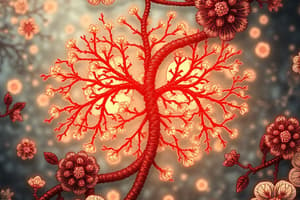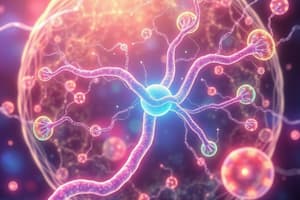Podcast
Questions and Answers
What is metabolism primarily defined as?
What is metabolism primarily defined as?
- The transportation of nutrients in the bloodstream
- The sum of all chemical reactions that occur in the body (correct)
- The synthesis of proteins within cells
- The decomposition of large molecules into energy
Which term refers to the building of molecules from smaller units?
Which term refers to the building of molecules from smaller units?
- Metabolism
- Anabolism (correct)
- Respiration
- Catabolism
What is the primary process that converts glucose into energy within cells?
What is the primary process that converts glucose into energy within cells?
- Cellular respiration (correct)
- Fermentation
- Photosynthesis
- Protein synthesis
Which of the following best describes catabolic reactions?
Which of the following best describes catabolic reactions?
Which of the following options is NOT a characteristic of metabolism?
Which of the following options is NOT a characteristic of metabolism?
Study Notes
Metabolism
- Encompasses all chemical reactions occurring within the body, essential for maintaining life.
- Divided into two main categories:
- Synthesis Reactions (Anabolism):
- Involves the formation of complex molecules from simpler ones.
- Crucial for growth, repair, and maintenance of body tissues.
- Decomposition Reactions (Catabolism):
- Involves the breakdown of complex molecules into simpler ones.
- Releases energy stored in chemical bonds, often used to produce ATP.
- Synthesis Reactions (Anabolism):
Cellular Respiration
- A series of metabolic reactions occurring within cells.
- Primarily responsible for converting glucose into adenosine triphosphate (ATP), the energy currency of the cell.
- Critical for fueling cellular processes and maintaining energy balance in living organisms.
Chemical Reactions in the Body
- Metabolism plays a key role in the continuous chemical transformations necessary for life.
- Both synthesis and decomposition reactions contribute to homeostasis and energy management within organisms.
- Understanding these processes is vital for areas like nutrition, exercise physiology, and disease management.
Studying That Suits You
Use AI to generate personalized quizzes and flashcards to suit your learning preferences.
Description
Test your knowledge on the processes of metabolism, including the two main types of chemical reactions: synthesis and decomposition. Explore the role of cellular respiration in converting glucose to energy. This quiz covers fundamental concepts in biochemistry.




